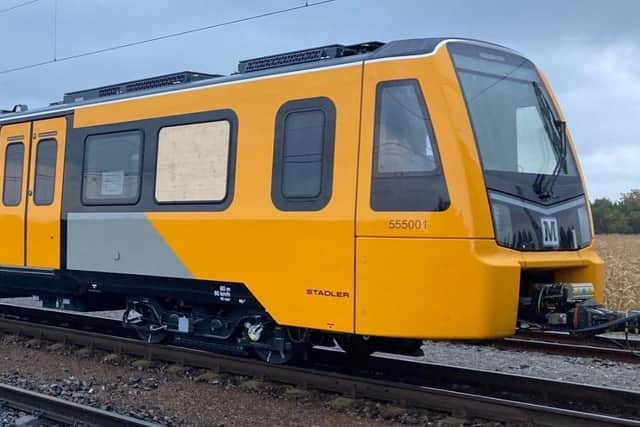Metro scraps WiFi plan for new fleet of trains over costs - transport chiefs hope for 'seamless' 4G and 5G signal instead
and live on Freeview channel 276
WiFi connectivity was meant to be one of the upgrades coming with the Metro’s long-awaited new £362million fleet of trains, the first of which is now in the UK and should shortly arrive in the North East.
But transport chiefs announced on Friday that they have decided against the move, saying it would be too costly and likely used by “very few” people.
Advertisement
Hide AdAdvertisement
Hide AdHowever, Metro operator Nexus still has big plans to boost digital connectivity on the network in other ways.


The public body says it will instead focus its investment on improving 4G and 5G connection across the Metro system, getting rid of “not spots” around the network.
That will mean passengers should be able to get a signal in problem areas, including tunnels and near the coast.
EE customers have enjoyed 4G signals in the Metro tunnels running underneath Newcastle city centre and Gateshead since 2019, but Nexus says efforts to get other mobile networks on board too were hampered by the Covid pandemic.
Customer Services Director, Huw Lewis, said: “We want customers to enjoy unbroken 4G and 5G connectivity on smart phones as they travel around the region, whether that is while getting to a station, waiting on the platform, or travelling on trains.
Advertisement
Hide AdAdvertisement
Hide Ad“We’ve done research with customers which shows that people now value a good connection for their phone, using their own data, rather than wanting to log in to a WiFi service provided by a train operator, particularly when most people travel on Metro for only a short period.
“This is not surprising because data is cheap and the signal from masts in and around railways is much stronger than it was a few years ago – in fact research a few years ago by comparable operators showed as few as 4% to 5% of customers choose to use on-train WiFi.”
While the new trains, which should start entering passenger service later this year, will not have WiFi, they will still boast a raft of other improvements – including air conditioning and charging points.
Mr Lewis added: “On-train WiFi is expensive to provide and maintain, and itself relies on local masts for connectivity, and we now feel it offers little benefit to customers compared to the high cost of building then maintaining a bespoke system.
Advertisement
Hide AdAdvertisement
Hide Ad“Customer choice and aspirations have changed a great deal since we first outlined the specification for our new fleet in 2018 and we are reflecting this in choosing to work on improving connectivity to personal accounts rather than spending money on WiFi that will be little used.
“There are challenges – an independent survey across the Metro network identified our customers will see strong connectivity on a train across most of the network, but there are a number of small stretches where it could be much better.
“These include the tunnels through city centres, and where Metro runs close to the coast, there are fewer surrounding masts.
"Connectivity varies between phone companies and we want our customers to be able to access a range of networks.
“What we are doing now is engaging with the major network providers to build a plan to improve connectivity steadily for all mobile customers, and while this will take time, we are confident we will see a steady improvement as this programme develops.”